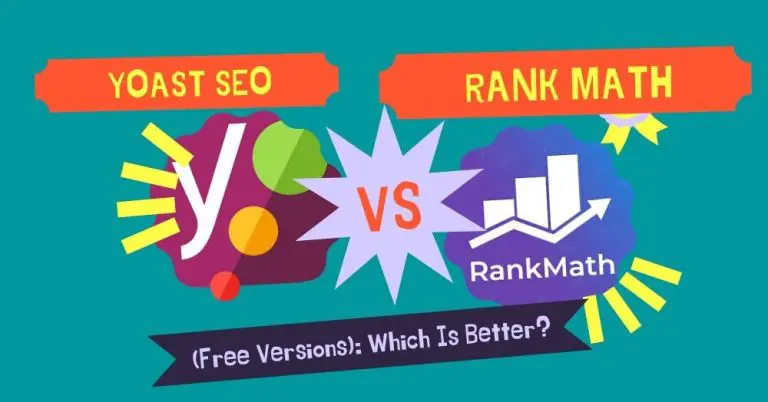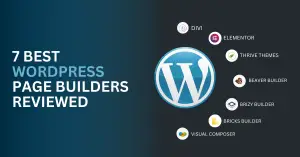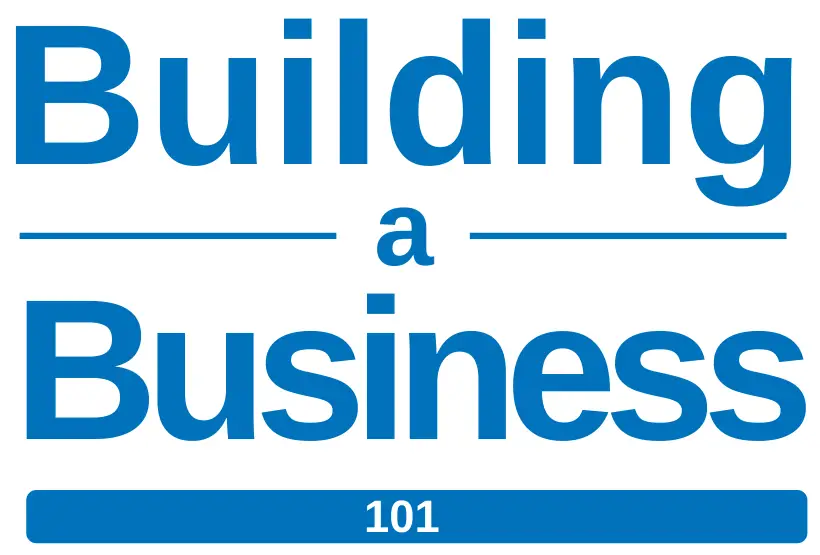When it comes to ranking your website or blog, Search Engine Optimization (SEO) is one of the essential things to consider. Two of the most common SEO plugins that WordPress bloggers and website owners use are Yoast SEO and Rank Math.
As a beginner, you might not be very much aware of the functionalities of both plugins. A Google search might seem helpful, but the information can turn out to be too technical to digest.
Therefore, we decided to create a comprehensive guide to compare the two plugins so that you can choose the right one for your specific needs.
Although this article will talk a little about Yoast’s paid/premium version, we will be primarily comparing Rank Math with the free version. We feel it would be unfair to compare a free product to a paid one.
Comparison of Different Features of Both Plugins
Until now, we had a general discussion about different aspects of both the plugins. In this section, we will compare them side by side.
Rank Math vs. Yoast SEO – Plugin Size And Site Speed
Yoast has been around for ages. And as such, the software architecture is older. So Rank Math has the advantage of advances in technology when building out its plugin. As such, they can build a feature-rich plugin from the get-go without the worry of breaking the plugin.
Rank Math has structured data markup, redirection, AMP connection all built into its plugin. That is not the case with Yoast. You would need to use a different plugin to add these features.
As it currently sits, Yoast’s plugin size is 11.9MB, while Rank Math’s is 7.3MB.
Because you don’t need multiple plugins to do everything, your website speed should be faster with Rank Math, assuming everything else is equal.
Plugin Size Advantage: Rank Math
Rank Math vs. Yoast SEO – User Interface
There is no doubt that user interface plays a crucial role in any plugin or theme’s success.
Rank Math has a visually appealing interface that looks modern and spacious. There is clear and concise information about different features, which makes it easy to use.
Yoast seems to trail Rank Math in terms of user-friendliness. Yes, the plugin is much more organized and contains more information than Rank Math, but it looks cluttered. The colors are also unappealing and give a vintage feeling.
A better approach could be to summarize the info in fewer words and create more expansive space among different categories.
User Interface Advantage: Rank Math
Rank Math vs. Yoast SEO – Content Analysis
The core feature of both plugins is the ability to analyze and optimize your content in real-time. That is an area in which I think Yoast SEO is pretty far ahead of Rank Math in.
In addition to analyzing your posts for typical SEO factors like keyword density, H2/H3 tags, internal linking, etc…Yoast also analyzes your writing. The plugin analyzes:
- Sentence length
- Reading ease using Flesch score
- Passive voice
- Consecutive sentences
- Subheading distribution
- Paragraph length
- Transition words
It gives you a red, yellow, or dot for each of the above metrics. And the really cool thing is that it gives you the ability to see precisely where in your content you can improve by clicking on the eyeball. Once you click on the eyeball, it will highlight where you can improve. See the image below.
Rank Math’s content analysis is not as developed. For one, it does not have the eyeball feature to show you exactly where you can improve. Additionally, it does not have as many metrics in which to grade your actual content. Here are aspects of your content it analyzes:
- Use of table of content
- Paragraph length
- Use of rich media in post
However, Rank Math does grade several aspects of your post title that Yoast SEO doesn’t, such as:
- Whether your title has words portraying positive or negative sentiment
- Whether your title contains a power word
- Whether your title includes a number
Content Analysis Advantage: Yoast SEO
Rank Math vs. Yoast SEO – Onpage SEO
Onpage SEO is pretty good with both plugins.
Both allow you to add a focus keyword and then analyze your titles, H2/H3 headings, content, and meta descriptions for those keywords to ensure that you are using it (or variations) enough.
Both also have a feature that ensures you have internal links to other posts. Rank Math has an internal link suggestion tool to suggest posts/content for you to link to. The Yoast SEO premium version also does this. However, Yoast’s free version just lets you know if you have internal links in the post and many internal links you’ve linked to for each post.
Onpage SEO Advantage: Rank Math
Rank Math vs. Yoast SEO – Technical SEO
Both plugins have essential technical SEO functions like creating sitemaps, custom meta descriptions, schema categorization, rules for search engine robots (no snippet, no indexing a post, nofollow links in the post, etc.).
Rank Math has a built-in feature to find 404s errors. Also, it has a feature to do redirects. Yoast does not have either functions inherent in its software.
Technical SEO Advantage: Rank Math
Both also Rank Math vs. Yoast SEO – Keyword Analysis
As discussed at the start, using keywords throughout your content is an integral part of SEO. Both plugins have this feature, which allows the user to set the focus keyword of an article and then use it in the title, subheadings, and meta description, among other places.
Rank Math allows you to select five focus keywords per article.
With Yoast’s free version, you can only set one focus keyword per article. Yoast’s premium version has a pretty cool feature for you to integrate with SEMRush to get related keywords and variations of your focus keywords. But again, this article compares the free version of both software.
Keyword Analysis Advantage: Rank Math
Rank Math vs. Yoast – Compatibility With Visual Builders
The rise of page builders has undoubtedly made crafting visually appealing articles much more manageable. Elementor Pro, Thrive Themes, Beaver Builder, and Visual Composer all have feature-rich plugins that allow someone with no coding experience to build beautiful pages.
However, be forewarned that if you use a visual page builder plugin for WordPress, the two SEO plugins might not be perfectly compatible.
Yoast SEO can do a readability analysis on your posts if you are using a page builder. Thus it will let you know if you are doing well with passive voice, consecutive sentences, subheading distribution, etc. And it will give you a red, yellow, or green light for each analysis of your post. However, it is unable to highlight where you will need to improve. Here is an example of a site using Thrive Architect and Yoast SEO.
As you can see, it gives me feedback on my post.
However, when I try to press the readability eye icon to show me where I need to improve with my transition words, nothing is highlighted. Even after you press “Launch Thrive Architect”, it won’t work. The readability eyeball is one of the most useful functions of the plugin, so it is too bad that it doesn’t function as should with most page builders. However, all other functions of Yoast SEO seem to work fine with visual page builders.
Rank Math is perfectly compatible with a fair amount of page builders. According to the company, Rank Math is compatible with Astra, Elementor, Beaver Builder, Divi, and Page Builder.
Additionally, Rank Math has built a content analysis API to integrate with your favorite page builder if it is not compatible.
Because Rank Math doesn’t have the readability eye icon feature, Yoast SEO doesn’t trail in this category as that is the only feature of Yoast that doesn’t work with page builders.
Compatibility With Page Builder Advantage: Tie
Yoast Versus Rank Math – Which is Better?
Honestly speaking, it is not easy to declare anyone a winner. It all depends on your needs and requirements.
In the sections above, we rated which plugin had the advantage of certain aspects of SEO. Here is the summary of it:
| Yoast SEO (Free Version) | Rank Math | |
| Plugin Size | ✅ | |
| User Interface | ✅ | |
| Content Analysis | ✅ | |
| Keyword Analysis | ✅ | |
| Onpage SEO | ✅ | |
| Technical SEO | ✅ | |
| Compatibility With Page Builders | ✅ | ✅ |
If you are looking for an SEO plugin that will analyze and improve your writing and reader experience, it would be Yoast SEO hands down. The content analysis tool that gives you live feedback on where you can improve is a feature that is not available on Rank Math (yet). And although it looks like Rank Math beats out Yoast’s free version in almost every category—the content analysis feature is the most important category to me. And that is why we continue to use the plugin for a fair number of sites.
However, if you are looking for a lightweight plugin that is feature-rich, you should go with Rank Math. It’s an incredibly well-rounded plugin that includes features that compare to the paid version of Yoast.




